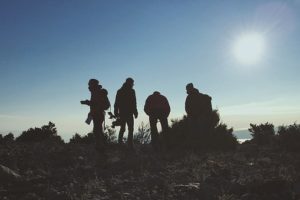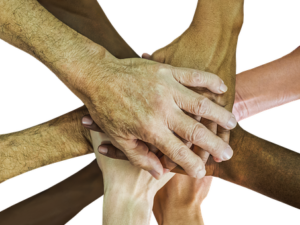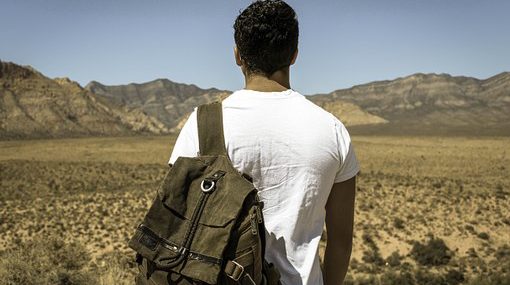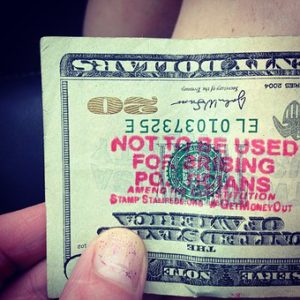 It was October 1986. Hitchhiking across the country, Sebastian Junger stood outside of Gillette Wyoming, carrying a week’s worth of food in his backpack. A man in a soiled union suit walked up the on-ramp toward him. The man’s hair looked wild and matted, but he didn’t seem hostile. Still, Sebastian was young and alone and watched him like a hawk.
It was October 1986. Hitchhiking across the country, Sebastian Junger stood outside of Gillette Wyoming, carrying a week’s worth of food in his backpack. A man in a soiled union suit walked up the on-ramp toward him. The man’s hair looked wild and matted, but he didn’t seem hostile. Still, Sebastian was young and alone and watched him like a hawk.
 The man studied him and asked where he was headed.
The man studied him and asked where he was headed.
“California.”
He nodded. “How much food do you got?”
Sebastian was happy to share his food, but he didn’t want to be robbed.
“Oh, I just got a little cheese.”
He shook his head. “You need more than that.”
Turns out the man lived in a broken-down car. Every day he walked three miles to a coal mine to see if they needed extra hands. Some days they didn’t and that day was one of them.
 “I won’t be needing this,” he said opening his lunchbox, which contained a bologna sandwich, an apple, and a bag of chips—probably provided by a church. “I saw you from town and just wanted to make sure you were okay.” The guy turned and headed toward Gillette.
“I won’t be needing this,” he said opening his lunchbox, which contained a bologna sandwich, an apple, and a bag of chips—probably provided by a church. “I saw you from town and just wanted to make sure you were okay.” The guy turned and headed toward Gillette.
Sebastian thought about that man for the rest of his trip. In fact, he thought about him for the rest of his life.
It was more than generosity. In some way, that kind man took responsibility for him. “For reasons I’ll never know,” he wrote, “the man in Gillette decided to treat me like a member of his tribe.”
 In his recent book, Tribe, Sebastian Junger ponders “why that sentiment is such a rare and precious thing in modern society, and how the lack of it has affected us all.” Our modern world has stripped away peoples’ sense of purpose, authenticity, and community. Oddly enough, to many “war feels better than peace and hardship can turnout to be a great blessing and disasters are sometimes remembered more fondly than weddings or tropical vacations.”
In his recent book, Tribe, Sebastian Junger ponders “why that sentiment is such a rare and precious thing in modern society, and how the lack of it has affected us all.” Our modern world has stripped away peoples’ sense of purpose, authenticity, and community. Oddly enough, to many “war feels better than peace and hardship can turnout to be a great blessing and disasters are sometimes remembered more fondly than weddings or tropical vacations.”
What has our prevailing culture done to us? For all our medical, scientific, technological, and educational advances, it might all come down to this—with whom would you share your last bit of food?
 Consider the meaning of “tribe” beyond racial terms or bloodline connections. Think of it as the people in your realm that you do life with. The circle of friends and family who have your back, who share their resources, who need what you can contribute, as you need them. The ones who challenge you to be an authentic person by being genuine themselves. The people who show up when everything’s in pieces.
Consider the meaning of “tribe” beyond racial terms or bloodline connections. Think of it as the people in your realm that you do life with. The circle of friends and family who have your back, who share their resources, who need what you can contribute, as you need them. The ones who challenge you to be an authentic person by being genuine themselves. The people who show up when everything’s in pieces.
 I believe a tribal culture in this sense has to be pursued, because everything in our modern world undermines the experience of community we desperately need.
I believe a tribal culture in this sense has to be pursued, because everything in our modern world undermines the experience of community we desperately need.
Our sophisticated civilization is full of people without purpose, often living duplicitous lives, talking through devices, with the goal of earning enough money so they “don’t need nothing from nobody.” I could go on. Suffice it to say that our culture is toxic to our design.
We were created to be tribal.
 Finding your tribe is the essence of the Kingdom of God. Some reference the organic unity of a physical body—the body of Christ. Yet this perfect metaphor can be a far cry from organized church structures. It comes down to a few dozen people who pour their lives into each other. But it has to be more than individual relationships. A tribe involves a group dynamic.
Finding your tribe is the essence of the Kingdom of God. Some reference the organic unity of a physical body—the body of Christ. Yet this perfect metaphor can be a far cry from organized church structures. It comes down to a few dozen people who pour their lives into each other. But it has to be more than individual relationships. A tribe involves a group dynamic.
Too often in our Christian experience, we end up as spectators at church. We stay at the level of “greeting” others. Few get down to the small group level where I believe church really happens.
 In my “tribal” experience, we pass an offering basket when someone has financial needs. We cook dinners for each other when someone is ill, injured, or grieving. We share garden produce and buy each other’s handiwork. We’ve learned to listen and encourage honesty, authenticity, and confidentiality. No one’s alarmed when anger and hurt arise. We actively practice forgiveness. The group offers comfort, prayer, and hope.
In my “tribal” experience, we pass an offering basket when someone has financial needs. We cook dinners for each other when someone is ill, injured, or grieving. We share garden produce and buy each other’s handiwork. We’ve learned to listen and encourage honesty, authenticity, and confidentiality. No one’s alarmed when anger and hurt arise. We actively practice forgiveness. The group offers comfort, prayer, and hope.
 Though we agree with God’s moral standards, there’s no whiff of judgment if one has a son in trouble with the law, or an unmarried daughter with a baby, or an alcoholic spouse. And interestingly, we do not all attend the same denomination. Still, we are a tribe.
Though we agree with God’s moral standards, there’s no whiff of judgment if one has a son in trouble with the law, or an unmarried daughter with a baby, or an alcoholic spouse. And interestingly, we do not all attend the same denomination. Still, we are a tribe.
And many tribes together, built on the same foundation of Jesus Christ, can cultivate kingdom culture and bring unity across generations, cultures, nationalities, and races, serving as a light in this critical time of human history.
Have you found your tribe?









I’ve always been an encourager because my mom was the Queen of Encouragement, but I failed to see it as part of tribe behavior. I was just following my mom’s example, and didn’t understand that the Body of Christ is more than busy little bees rushing about serving others. It’s so much bigger, and the receiving end of it is an integral part. When suddenly I was on the receiving end, that’s when the whole system became obvious to me. That’s when I realized I’m part of His Body, not just a helpful individual.
I was unaware of the vastness of my tribe until my son went to jail for murder. Loving and encouraging cards, calls, texts, hugs, prayers, offers of help, smiles, from people whose names I sometimes don’t even know – showering upon me! I’ve yet to be offered judgment or something less than utter love and support. What a privilege to glimpse what lies ahead as Christ’s return gets closer!
Linda, wow–the vastness of your tribe, very moving to hear… S
Susan,
This is a very timely post! We have lost that sense of community in many ways and it is sad that we have traded it for loneliness in many cases.
A sense of belonging was a main reason I returned to the military. There are many tribes in the service and I have finally found the one I got best with. Your line about “war feels better than peace” is very true! We have a purpose and it helps us get through the hardships and time spent away from friends and family. It is amazing how little you actually need to live happily; war has taught me that and many more lessons.
Mr. Junger certainly understands the tribal nature of the military. His book War captures beautifully the conraderie and esprit de corps of a breed apart.
Your posts never fail to encourage and remind me what “normal” life is like. Thank you.
Mike! Thank you! Junger’s book had a lot in it and I highly recommend it!
Susan,
I love this concept of the “tribe” and the community that is critical to it. We so often try to run independently, as our culture encourages; however, we are definitely made to be “pack animals”. I am thankful for my tribe and feel disconnected and vulnerable without them. There have been shifts in my tribe over the years, yet we have stayed connected in the heart.
Crystal–so good to hear! Glad to hear that you have a tribe!